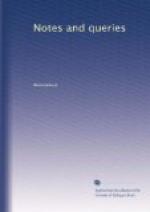Crows.—To see a crow flying alone is a token of bad luck. An odd one, perched in the path of the observer, is a sign of wrath.
Owls.—The ominous screech of this, the most ominous of all birds, is still heard with alarm; and he remains with us, as in Chaucer’s days,
“The oule eke that of deth the bode bringeth.”
When, as sometimes happens, he exchanges the darkness of his ivy bush for the rays of the sun at noon-day, his presence is looked upon as indicative of bad luck to the beholder. Hence it not infrequently happens that a mortal is as much scared by one of these occasional flights as the small bird denizens of the tree on which he may happen to alight.
Cuckoos.—When the cry of the cuckoo is heard for the first time in the season, it is customary to turn the money in the pocket, and wish. If within the bounds of reason, it is sure to be fulfilled. In reference to the pecuniary idea respecting the cuckoo, the children sing,
“Cuckoo, cuckoo, cherry tree
Catch a penny and give it to me.”
Robins and Wrens.—The robin is considered a sacred bird: to kill one is little less than sacrilege, and its eggs are free from the destroying hand of the bird-nester. It is asserted that the respect shown to it by man is joined in by the animals of the wood. The weasel and wild cat, it is said, will neither molest it, nor eat it when killed. The high favour in which this bird is held is usually attributed to the ballad of The Babes in the Wood. Few, however, among the peasantry of this district have even heard of it; and, however much that beautiful tale may have tended to popularise the belief, it is evident that we must trace the origin to a more remote source. One cause for the veneration in which it is held may be the superstition which represents him as the medium through which mankind are warned of approaching death. {165} Before the death of a person, a robin is believed, in many instances, to tap thrice at the window of the room in which he or she may be. The wren is also a bird which superstition protects from injury; but it is by no means treated with such reverence as the robin. The praises of both are sung in the old couplet:—
“The robin and the wren,
Be God A’mighty’s cock and
hen.”
Pigeons.—No one, it is believed, can die on pigeons’ feathers. In the northern parts of the county, the same thing is said of game feathers,—a superstition also current in Kent.—Ingolsby Legends, Third Series, p. 133.
Wasps.—The first wasp seen in the season should always be killed. By so doing you secure to yourself good luck and freedom from enemies throughout the year.
Bees.—The superstitious ceremonies and observances attached to these animals appear to be current throughout the kingdom, and by no means suffer any diminution in this county. Among others of less common occurrence, we have the belief that they will not thrive in a quarrelsome fammily.




